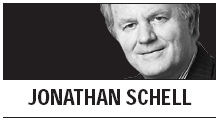NEW YORK ― After the second debate between U.S. President Barack Obama and his Republican challenger, Mitt Romney, Obama’s supporters chorused in near-unison, “He’s back!” The languid, disengaged, and lackluster performer of the first debate had disappeared, and the impressive, beloved figure of the victorious 2008 campaign had reappeared. As the commentator Andrew Sullivan put it, “I saw the person I first saw...I saw the president I thought I knew.”

To my eye, however, the old Obama was not back. A new Obama had appeared. The old Obama was youthful, charming, graceful, and full of hope. His demeanor was crisp yet easy-going. His rhetoric soared. His smile could light up a stadium.
The Obama on display in the second debate ― and the third ― was harder, chillier, sadder, and more somber. There was tension in the lines of his mouth. His speech was clipped, as if under continuous rigorous control. His rhetoric did not soar, could not soar. The smile was rare and constrained.
But his command of detail and argument was rock solid. His sentences parsed. He spoke with a cold, disciplined energy. In repose (as witnessed on the split screen in the reaction shots) he was often perfectly immobile, almost stony, as if posing for a portrait.
One word for all of this would be “presidential,” in the sense of competent, seasoned, and sobered by reality. But that word also connotes the fearsome qualities of ruthlessness and brutality that any honest portrayal of the office of president of the United States must include in our day. Obama has inhabited the White House for four years; now the White House inhabits him.
Twice this autumn, Obama had already performed before tens of millions of people ― in his acceptance speech at the Democratic convention and in the first debate. Each time, his performance was flat. At the convention, he seemingly hoped to summon the old Obama, to charm and soar, but that man was simply no longer available.
The truth appears to be that his muse deserted him sometime in the first year of his presidency. The result was a simulacrum of the old Obama, as if he were acting the part of himself.
Then, in the first debate, no such futile effort was even made, and there was no Obama at all, neither old nor new. As so many commentators noted, in some sense he simply failed to show up. Perhaps he also thought that, well ahead in the polls, he did not have to bother to engage the pesky fellow who imagined replacing him in the White House.
At the second debate, the loss of the old Obama was apparently accepted and a new one ― existing, real, available, and now working in the Oval Office ― made its first appearance.
Has the presidency hardened Obama? Has it brutalized him? There are reasons for thinking that it has.
First, Obama has taken, perhaps, a heavier beating from his political opposition than most presidents. The theme of Obama’s life, clearly expressed in his eloquent memoir Dreams from My Father, and shown in the recent Frontline documentary The Choice, is reconciliation. He is not a man whose identity was handed to him by birth. Born of a white mother and an absentee Kenyan father, residing in Indonesia as a boy, raised in adolescence by a white single mother in Hawaii, he was forced to figure out his place in life on his own. He found it in the idea of reconciliation ― both racial and ideological.
That was the theme of his defining speech at the Democratic convention in 2004, with its famous line, “There is not a liberal America and a conservative America; there is the United States of America.”
It was to be the theme of his presidency. So, when an ideologically implacable Republican opposition, in his very first days in office, threw the vision back in his face, adopting a policy of scorched-earth opposition, the rejection was about more than policy ― it affected his very being. The dreams from his father were at an end, and he was left, as he only slowly realized, with the themeless pragmatism that has become the hallmark of his administration.
Unable to find common ground with the Republican opposition, he cut deals with the other powers that immediately surround the presidency: the military and security apparatus, big pharmaceutical companies, big banks, and big media. Perhaps more important was the permission that he gave himself for violence and suppression of rights: drone strikes that have killed children as well as terrorists, the futile “surge” in Afghanistan, the continued operation of the prison at Guantnamo Bay, reliance on military tribunals, an unprecedented campaign against whistle blowers, and the assertion of a right to order the assassination of foreigners and Americans alike at his sole discretion.
All this, too, stood behind the performance of the man on stage during the second two debates. And if he is elected, it is this man who will govern. The Obama of 2008 is not back. He is not coming back. He is gone forever.
By Jonathan Schell
Jonathan Schell is a fellow at The Nation Institute and a visiting fellow at Yale University. He is the author of “The Seventh Decade: The New Shape of Nuclear Danger.” ― Ed.
(Project Syndicate)








